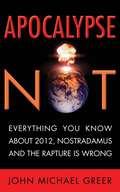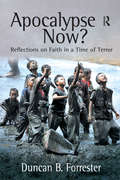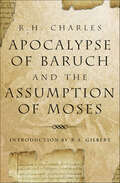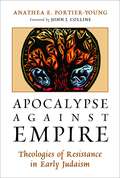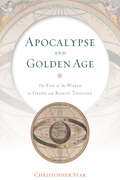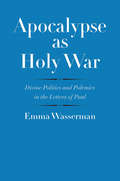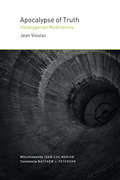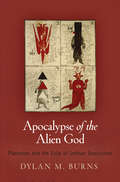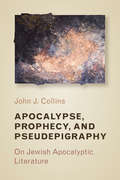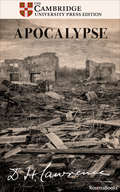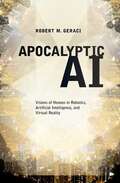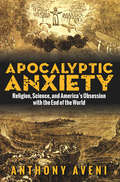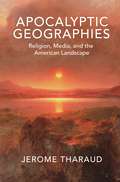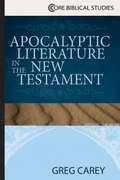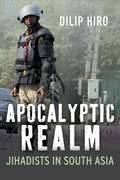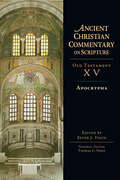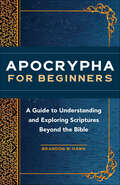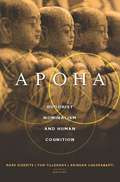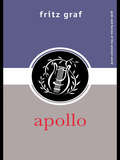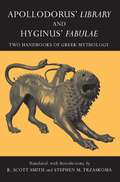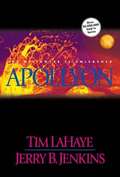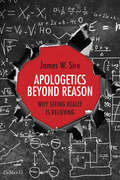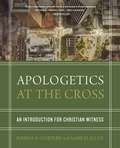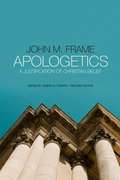- Table View
- List View
Apocalypse Not: Everything You Know About 2012, Nostradamus and the Rapture Is Wrong
by John GreerFor almost 3,000 years apocalypse prophecies have convinced people all over the world that the future is about to give them the world they want instead of the world they've got. All the end time prophecies splashed across the media in every age have had something else in common: every one of them has been wrong. Apocalypse Not is a lively and engaging survey of predictions about the end of the world, along with the failed dreams and nightmares that have clustered around them. Among the stories highlighted in Apocalypse Not are: the birth of the apocalypse meme out of archaic star myths in the ancient Middle East; the failed end time prophecies of Nostradamus, Mother Shipton, and other famous prophets; the long and murky road from the Great Pyramid to today's Rapture beliefs; and the real origins of the belief in apocalypse in 2012 (hint: it's not originally Mayan at all).
Apocalypse Now?: Reflections on Faith in a Time of Terror
by Duncan B. ForresterHow may people of faith respond wisely, constructively, and courageously to the challenges of a time of terror? How might religious reasons in public debate be a force for reconciliation rather than violence and hatred? In a world in which religious arguments and religious motivations play such a huge public role, there is an urgent responsibility for interpreting what is happening, and engaging with religious views which are commonly regarded as alien, threatening or dangerous. In Apocalypse Now?, Duncan Forrester argues that disorders and atrocities which include the Gulag, the Holocaust, 9/11, the Afghanistan and Iraq wars, and the Tsunami disaster have shown us that we stand not at the end of history but in the midst of an apocalyptic age of terror which has striking similarities to the time in which Christianity was born. Moving between two times of terror - the early Centuries of Christianity, and today - Forrester asks how religious motivations can play a positive role in the midst of conflicts and disasters. Reading the 'signs of the times' to try to understand what is happening in today's age of terror, Forrester argues that there are huge resources in the Christian tradition that can be productively deployed for a more constructive and faithful response. We are at a turning point - this is a book which should be read.
Apocalypse Of Baruch And The Assumption Of Moses (Weiser Enochian Library)
by R.H. Charles, William John Ferrar and R.A. GilbertIt is no longer news that the texts that became the official Bible excluded apocryphal books, in many cases because they didn't serve the worldview of the ruling classes. Early in the 20th century, R.H. Charles translated and edited a series of these texts. In 2003, we published The Book of Enoch, apocrypha describing the hierarchy of angels and demons. Now we are pleased to publish this significant end-times text.Writing at the time of the destruction of Jerusalem in 70 ad, Baruch converses directly with God in a series of visions. The fall of Jerusalem is given as part of a larger end-of-the-world scenario. Baruch then receives prophecy: periods of light and darkness shall come, symbolized by rains bright and black, corresponding to alternating times when humanity lives in peace and harmony, then dark periods when evil reigns. Of particular note is the apocalypse when the Messiah appears again on earth. This alternate tale of the apocalypse inspires hope -- evil is punished, condemned to hell and cast off the earth, while those "left behind" are actually the righteous who will enjoy, literally, heaven on earth. Obviously a differing view from the currently in-vogue idea of "rapture."Also included in this edition is "The Assumption of Moses," an apocryphal fragment noted to have influenced other descriptions of the apocalypse included in the Bible."For at the heights of the world they shall dwell,And they shall be made like unto the angels,And be made equal to the stars,And they shall be changed into every form they desire,From beauty into loveliness,And from that light into the splendour of glory."
Apocalypse against Empire: Theologies of Resistance in Early Judaism
by Anathea E. Portier-YoungA fresh and daring take on ancient apocalyptic books. The year 167 b.c.e. marked the beginning of a period of intense persecution for the people of Judea, as Seleucid emperor Antiochus IV Epiphanes attempted — forcibly and brutally — to eradicate traditional Jewish religious practices. In Apocalypse against Empire Anathea Portier-Young reconstructs the historical events and key players in this traumatic episode in Jewish history and provides a sophisticated treatment of resistance in early Judaism. Building on a solid contextual foundation, Portier-Young argues that the first Jewish apocalypses emerged as a literature of resistance to Hellenistic imperial rule. She makes a sturdy case for this argument by examining three extant apocalypses, giving careful attention to the interplay between social theory, history, textual studies, and theological analysis. In particular, Portier-Young contends, the book of Daniel, the Apocalypse of Weeks, and the Book of Dreams were written to supply an oppressed people with a potent antidote to the destructive propaganda of the empire — renewing their faith in the God of the covenant and answering state terror with radical visions of hope..
Apocalypse and Golden Age: The End of the World in Greek and Roman Thought
by Christopher StarHow did the ancient Greeks and Romans envision the end of the world?What is the long-term future of the human race? Will the world always remain as it is or will it undergo a catastrophic change? What role do the gods, human morality, and the forces of nature play in bringing about the end of the world? In Apocalypse and Golden Age, Christopher Star reveals the answers that Greek and Roman authors gave to these questions. The first large-scale investigation of the various scenarios for the end of the world in classical texts, this book demonstrates that key thinkers often viewed their world as shaped by catastrophe. Star focuses on how this theme was explored over the centuries in the works of poets, such as Hesiod, Vergil, Ovid, and Lucan, and by philosophers, including the Presocratics, Plato, Epicurus, Lucretius, Cicero, and Seneca. With possibilities ranging from periodic terrestrial catastrophes to the total dissolution of the world, these scenarios address the ultimate limits that define human life and institutions, and place humanity in the long perspective of cosmic and natural history. These texts also explore various options for the rebirth of society after world catastrophe, such as a return of the Golden Age or the redevelopment of culture and political institutions. Greek and Roman visions of the end, Star argues, are not calls to renounce this world and prepare for a future kingdom. Rather, they are set within larger investigations that examine and seek to improve personal and political life in the present. Contextualizing classical thought about the apocalypse with biblical studies, Star shows that the seeds of our contemporary anxieties about globalization, politics, and technology were sown during the Roman period. Even the prevalent link between an earthly leader and the beginning of the end times can be traced back to Greek and Roman rulers, the emperor Nero in particular. Apocalypse and Golden Age enriches our understanding of apocalyptic thought.
Apocalypse as Holy War: Divine Politics and Polemics in the Letters of Paul (The Anchor Yale Bible Reference Library)
by Emma WassermanPrevailing theories of apocalypticism assert that in a world that rebels against God, a cataclysmic battle between good and evil is needed to reassert God’s dominion. Emma Wasserman, a rising scholar of early Christian history, challenges this interpretation and reframes Paul’s apocalyptic texts as myths about politics in the world of divinity. Wasserman argues that the most dominant historical-critical theories about Christian apocalypticism are ahistorical and tend to work with apologetic formulations of Christ’s victory and the uniqueness of Christianity. Assessing Paul’s claims about immanent war, divine enemies, and the transformation that will accompany Christ’s return, Wasserman sees him as envisioning a single, righteously ruled cosmic kingdom, the true nature of which will soon be revealed to all. A major scholarly contribution that ranges across Mediterranean and West Asian religious thought, this volume has broad implications for understanding Paul’s myth of heroic submission as well as his most distinctive ethical teachings.
Apocalypse of Truth: Heideggerian Meditations
by Jean VioulacWe inhabit a time of crisis—totalitarianism, environmental collapse, and the unquestioned rule of neoliberal capitalism. Philosopher Jean Vioulac is invested in and worried by all of this, but his main concern lies with how these phenomena all represent a crisis within—and a threat to—thinking itself. In his first book to be translated into English, Vioulac radicalizes Heidegger’s understanding of truth as disclosure through the notion of truth as apocalypse. This “apocalypse of truth” works as an unveiling that reveals both the finitude and mystery of truth, allowing a full confrontation with truth-as-absence. Engaging with Heidegger, Marx, and St. Paul, as well as contemporary figures including Giorgio Agamben, Alain Badiou, and Slavoj Žižek, Vioulac’s book presents a subtle, masterful exposition of his analysis before culminating in a powerful vision of “the abyss of the deity.” Here, Vioulac articulates a portrait of Christianity as a religion of mourning, waiting for a god who has already passed by, a form of ever-present eschatology whose end has always already taken place. With a preface by Jean-Luc Marion, Apocalypse of Truth presents a major contemporary French thinker to English-speaking audiences for the first time.
Apocalypse of the Alien God: Platonism and the Exile of Sethian Gnosticism (Divinations: Rereading Late Ancient Religion)
by Dylan M. BurnsIn the second century, Platonist and Judeo-Christian thought were sufficiently friendly that a Greek philosopher could declare, "What is Plato but Moses speaking Greek?" Four hundred years later, a Christian emperor had ended the public teaching of subversive Platonic thought. When and how did this philosophical rupture occur? Dylan M. Burns argues that the fundamental break occurred in Rome, ca. 263, in the circle of the great mystic Plotinus, author of the Enneads. Groups of controversial Christian metaphysicians called Gnostics ("knowers") frequented his seminars, disputed his views, and then disappeared from the history of philosophy—until the 1945 discovery, at Nag Hammadi, Egypt, of codices containing Gnostic literature, including versions of the books circulated by Plotinus's Christian opponents. Blending state-of-the-art Greek metaphysics and ecstatic Jewish mysticism, these texts describe techniques for entering celestial realms, participating in the angelic liturgy, confronting the transcendent God, and even becoming a divine being oneself. They also describe the revelation of an alien God to his elect, a race of "foreigners" under the protection of the patriarch Seth, whose interventions will ultimately culminate in the end of the world.Apocalypse of the Alien God proposes a radical interpretation of these long-lost apocalypses, placing them firmly in the context of Judeo-Christian authorship rather than ascribing them to a pagan offshoot of Gnosticism. According to Burns, this Sethian literature emerged along the fault lines between Judaism and Christianity, drew on traditions known to scholars from the Dead Sea Scrolls and Enochic texts, and ultimately catalyzed the rivalry of Platonism with Christianity. Plunging the reader into the culture wars and classrooms of the high Empire, Apocalypse of the Alien God offers the most concrete social and historical description available of any group of Gnostic Christians as it explores the intersections of ancient Judaism, Christianity, Hellenism, myth, and philosophy.
Apocalypse, Prophecy, and Pseudepigraphy: On Jewish Apocalyptic Literature
by John J. CollinsA highly regarded expert on the Jewish apocalyptic tradition, John J. Collins has written extensively on the subject. Nineteen of his essays written over the last fifteen years, including previously unpublished contributions, are brought together for the first time in this volume. Its thematic essays organized in five sections, Apocalypse, Prophecy, and Pseudepigraphy complements and enriches Collins’s well-known book The Apocalyptic Imagination.
Apocalypse: And the Writings on Revelation (The Definitive Cambridge Editions of D.H. Lawrence)
by D. H. LawrenceThis collection of writings by the author of Sons and Lovers presents his thoughts on religion, art, psychology and politics in a newly restored text. Though D. H. Lawrence was one of the great writers of the twentieth century, his works were severely corrupted by the stringent house-styling of printers and the intrusive editing of timid publishers. A team of scholars at Cambridge University Press has worked for more than thirty years to restore the definitive texts of D. H. Lawrence in The Cambridge Editions. Written while he was dying, Apocalypse is Lawrence&’s final book. In it, he presents both a radical criticism of our civilization and a statement of unwavering belief in man&’s power to create &“a new heaven and a new earth.&” This volume also includes Lawrence&’s review of Book of Revelationby John Orman, and his Introduction to The Dragon of the Apocalypseby Frederick Carter. The Appendixes also present previously unpublished material on Revelation.
Apocalyptic AI: Visions of Heaven in Robotics, Artificial Intelligence, and Virtual Reality
by Robert M. GeraciApocalyptic AI, the hope that we might one day upload our minds into machines or cyberspace and live forever, is a surprisingly wide-spread and influential idea, affecting everything from the world view of online gamers to government research funding and philosophical thought. In Apocalyptic AI, Robert Geraci offers the first serious account of this "cyber-theology" and the people who promote it. Drawing on interviews with roboticists and AI researchers and with devotees of the online game Second Life, among others, Geraci illuminates the ideas of such advocates of Apocalyptic AI as Hans Moravec and Ray Kurzweil. He reveals that the rhetoric of Apocalyptic AI is strikingly similar to that of the apocalyptic traditions of Judaism and Christianity. In both systems, the believer is trapped in a dualistic universe and expects a resolution in which he or she will be translated to a transcendent new world and live forever in a glorified new body. Equally important, Geraci shows how this worldview shapes our culture. Apocalyptic AI has become a powerful force in modern culture. In this superb volume, he shines a light on this belief system, revealing what it is and how it is changing society.
Apocalyptic Anxiety: Religion, Science, and America's Obsession with the End of the World
by Anthony AveniApocalyptic Anxiety traces the sources of American culture’s obsession with predicting and preparing for the apocalypse. Author Anthony Aveni explores why Americans take millennial claims seriously, where and how end-of-the-world predictions emerge, how they develop within a broader historical framework, and what we can learn from doomsday predictions of the past. The book begins with the Millerites, the nineteenth-century religious sect of Pastor William Miller, who used biblical calculations to predict October 22, 1844 as the date for the Second Advent of Christ. Aveni also examines several other religious and philosophical movements that have centered on apocalyptic themes—Christian millennialism, the New Age movement and the Age of Aquarius, and various other nineteenth- and early twentieth-century religious sects, concluding with a focus on the Maya mystery of 2012 and the contemporary prophets who connected the end of the world as we know it with the overturning of the Maya calendar. Apocalyptic Anxiety places these seemingly never-ending stories of the world’s end in the context of American history. This fascinating exploration of the deep historical and cultural roots of America’s voracious appetite for apocalypse will appeal to students of American history and the histories of religion and science, as well as lay readers interested in American culture and doomsday prophecies.
Apocalyptic Geographies: Religion, Media, and the American Landscape
by Jerome TharaudHow nineteenth-century Protestant evangelicals used print and visual media to shape American cultureIn nineteenth-century America, "apocalypse" referred not to the end of the world but to sacred revelation, and "geography" meant both the physical landscape and its representation in printed maps, atlases, and pictures. In Apocalyptic Geographies, Jerome Tharaud explores how white Protestant evangelicals used print and visual media to present the antebellum landscape as a “sacred space” of spiritual pilgrimage, and how devotional literature influenced secular society in important and surprising ways.Reading across genres and media—including religious tracts and landscape paintings, domestic fiction and missionary memoirs, slave narratives and moving panoramas—Apocalyptic Geographies illuminates intersections of popular culture, the physical spaces of an expanding and urbanizing nation, and the spiritual narratives that ordinary Americans used to orient their lives. Placing works of literature and visual art—from Thomas Cole’s The Oxbow to Harriet Beecher Stowe’s Uncle Tom’s Cabin and Henry David Thoreau’s Walden—into new contexts, Tharaud traces the rise of evangelical media, the controversy and backlash it engendered, and the role it played in shaping American modernity.
Apocalyptic Literature in the New Testament (Core Biblical Studies)
by Greg CareyEvery significant layer of the New Testament features the distinctiveconcerns of apocalyptic literature, including the expectation of amessiah, hope for a resurrection, expectation of a final judgment, and aspiritual world that includes angels and demons. Yet many contemporaryreaders shy away from things apocalyptic, especially the book ofRevelation. This introduction considers the influence ofapocalyptic literature throughout the Gospels and Acts, Paul’s letters,and Revelation. It argues that early Christian authors drew uponapocalyptic topics to address an impressive array of situations andconcerns, and it demonstrates—example after example—how apocalypticdiscourse contributed to their ongoing work of contextual theology.
Apocalyptic Realm
by Dilip HiroThis hard-hitting and timely book explores the roots of militant Islam in South Asia and how it has grown to become a source of profound global alarm. By meticulously tracking the rise of the jihadist movement from its initial violence in Afghanistan in 1980 to the present day, Dilip Hiro challenges conventional narratives of the roles of Afghanistan, Pakistan, the Soviet Union, the United States, and India. He warns that the Line of Control in Kashmir, where jihadists seek to incite war between nuclear-armed Pakistan and India, is today the most dangerous border in the world. Drawing on evidence from a wide variety of sources including newly released Kremlin archives and classified U. S. Embassy documents published by WikiLeaks, the author compiles the first complete and accurate history of Islamist terrorism in South Asia. He chronicles historic links between Pakistan, Afghanistan, and India and their varying degrees of destabilization at the hands of the jihadists. He also sheds unprecedented light on the close military and intelligence links that have developed between India and Israel. Finally, he outlines the ambitions of Pakistani, Afghan, and Al Qaeda jihadists to establish an "apocalyptic realm" covering South, Central, and Western Asia. Compact, comprehensive, and fast paced, this book lays bare the causes of today's escalating terrorist threat, sets the historical record straight, and offers fresh strategies for defeating jihadist extremism.
Apocrypha (Ancient Christian Commentary on Scripture #15)
by Sever J. VoicuThis last volume of the Ancient Christian Commentary on Scripture offers commentary from the early church fathers on the deuterocanonical books of the Bible, with insights that will be of great benefit to preachers and teachers alike. Readers will find some ancient authors translated into English here for the first time. Throughout they will gain insight and encouragement in the life of faith as seen through ancient pastoral eyes.
Apocrypha for Beginners: A Guide to Understanding and Exploring Scriptures Beyond the Bible
by Brandon W. HawkGo beyond the Bible with this simple introduction to apocryphaWhether they were lost, cut, or censored, the various apocryphal stories offer unique opportunities to learn about the histories of Judaism and Christianity while broadening spiritual understanding. But exploring this vast canon of texts alone can be daunting. Apocrypha for Beginners makes it simple by offering a guided experience, helping explain each piece's importance and contextualize its place in history.This standout among religious books includes:More than 50 apocrypha—Delve into a variety of apocrypha from different eras and cultures, like the Book of Enoch, the Gospel of Judas, and more.In-depth commentary—Better understand each text with a brief summary of its origin, meaning, and cultural significance.Easy-to-follow info—Explore the history of Judaism and Christianity with the help of a detailed timeline, canon comparison chart, and index of important individuals.Take your Bible study to the next level with Apocrypha for Beginners.
Apoha: Buddhist Nominalism and Human Cognition
by Mark Tom Tillemans Arindam Chakrabarti Eds. SideritsWhen we understand that something is a pot, is it because of one property that all pots share? This seems unlikely, but without this common essence, it is difficult to see how we could teach someone to use the word "pot" or to see something as a pot. The Buddhist apoha theory tries to resolve this dilemma, first, by rejecting properties such as "potness" and, then, by claiming that the element uniting all pots is their very difference from all non-pots. In other words, when we seek out a pot, we select an object that is not a non-pot, and we repeat this practice with all other items and expressions.Writing from the vantage points of history, philosophy, and cognitive science, the contributors to this volume clarify the nominalist apoha theory and explore the relationship between apoha and the scientific study of human cognition. <P><P>They engage throughout in a lively debate over the theory's legitimacy. Classical Indian philosophers challenged the apoha theory's legitimacy, believing instead in the existence of enduring essences. Seeking to settle this controversy, essays explore whether apoha offers new and workable solutions to problems in the scientific study of human cognition. They show that the work of generations of Indian philosophers can add much toward the resolution of persistent conundrums in analytic philosophy and cognitive science.
Apollo (Gods and Heroes of the Ancient World)
by Fritz GrafFritz Graf here presents a survey of a god once thought of as the most powerful of gods, and capable of great wrath should he be crossed: Apollo the sun god. From his first attestations in Homer, through the complex question of pre-Homeric Apollo, to the opposition between Apollo and Dionysos in nineteenth and twentieth-century thinking, Graf examines Greek religion and myth to provide a full account of Apollo in the ancient world. For students of Greek religion and culture, of myth and legend, and in the fields of art and literature, Apollo will provide an informative and enlightening introduction to this powerful figure from the past.
Apollodorus' Library and Hyginus' Fabulae: Two Handbooks of Greek Mythology
by R. Scott Smith Stephen M. TrzaskomaBy offering, for the first time in a single edition, complete English translations of Apollodorus' Library and Hyginus' Fabulae--the two most important surviving "handbooks" of classical mythography--this volume enables readers to compare the two's versions of the most important Greek and Roman myths. A General Introduction sets the Library and Fabulae into the wider context of ancient mythography; introductions to each text discuss in greater detail issues of authorship, aim, and influence. A general index, an index of people and geographic locations, and an index of authors and works cited by the mythographers are also included.
Apollyon: The Destroyer Is Unleashed (Left Behind Series #Book 5)
by Tim Lahaye Jerry B. JenkinsThe #1 best-selling hardcover novel of 1999 is now available in softcover! The Tribulation Force travels to Israel for the Meeting of Witnesses as further judgments are released upon the world. Satan falls from heaven and opens the bottomless pit, releasing Apollyon and his plague of locusts that torture the unsaved. Now available in trade softcover, Apollyonis a thriller that will be tough to put down.
Apollyon: The Destroyer Is Unleashed (Left Behind, # #5)
by Tim Lahaye Jerry B. JenkinsThe world holds its breath as the Tribulation Force ventures to Jerusalem for the great Meeting of the Witnesses, where tens of thousands defy the Antichrist to sit under the ministry of their pastor-teacher, Tsion Ben-Judah. Meanwhile, Rayford Steele finally discovers the shocking truth about his wife, Amanda, but becomes an international fugitive. The fifth Trumpet Judgment-a plague of scorpion-like locusts led by Apollyon, chief demon of the abyss -is so horrifying that men try to kill themselves but are not allowed to die. This book has reached the New York Times best-seller list and is the most shocking and explicit portrayal yet in the continuing drama of those left behind.
Apologetics Beyond Reason: Why Seeing Really Is Believing
by James W. Sire"Look carefully. Listen closely. Do you see? Do you hear? There are a million signposts pointing toward the specific truth of God in Christ. I've seen many of them. But God is speaking to you too. Look and see. Listen and hear." In this accessible and engaging work, veteran apologist Jim Sire gives us eyes to see the myriad "signals of transcendence" all around us that point to the specific truth of God in Christ. Focusing on the power of good literature—even from those who deny the existence of God—enables us to perceive and testify to God's reality in ways that rational argument alone cannot. "While reason can be very helpful in pointing us to God and helping us in our apologetics, what compels and convinces people is more multidimensional," says Sire. "What is needed is a more holistic apologetic that not only includes truth but also goodness and beauty." All inspiration is rooted in God the Creator, and some of God's truth lies buried until an artist exposes it. Good literature, written from a Christian standpoint or not, displays multiple examples of our human understandings of God, the universe and ourselves. It testifies to the existence of a transcendent realm and often, in fact, to the truth of the Christian faith.
Apologetics at the Cross: An Introduction for Christian Witness
by Joshua D. Chatraw Mark D. AllenAmid the pluralism and secularism of Western culture, Christian apologetics has experienced a renewal of interest. In Apologetics at the Cross, Joshua D. Chatraw and Mark D. Allen provide an introduction to the field, acquainting students and lay learners with the rich history, biblical foundation, and ongoing relevance of apologetics.Unique in its approach, Apologetics at the Cross presents the biblical and historical foundations for apologetics, explores various contemporary methods for approaching apologetics, and gives practical guidance in "how to" chapters that feature many real-life illustrations. With their respectful approach, which pays special attention to the attitude and posture of the apologist, Chatraw and Allen equip Christians to engage skeptics with the heart as well as the mind.Conversational in tone and balanced in approach, Apologetics at the Cross provides a readable introduction to the field of apologetics. Readers will be informed and equipped for engaging a wide range of contemporary challenges with the best in Christian thought.
Apologetics: A Justification Of Christian Belief
by John M. Frame Joseph E. TorresRenowned theologian John Frame sheds much-needed light on the message and method of genuinely Christian apologetics in this landmark title. He insightfully examines apologetics in terms of proof, defense, and offense and clarifies the relationships of reason, proofs, and evidences to faith, biblical authority, and the lordship of Christ. <p><p> Two subjects of particular note are Frame's fresh look at probability arguments and a stimulating investigation into the problem of evil. <p> Some of the most valuable elements of this book are Frame's extensive use of Scripture and his presentation of specific lines of argument. There is also a model dialogue in the concluding chapter that shows how these lines of argument work in conversation.
